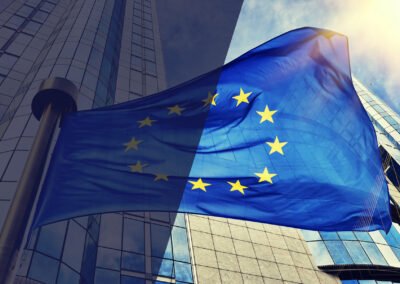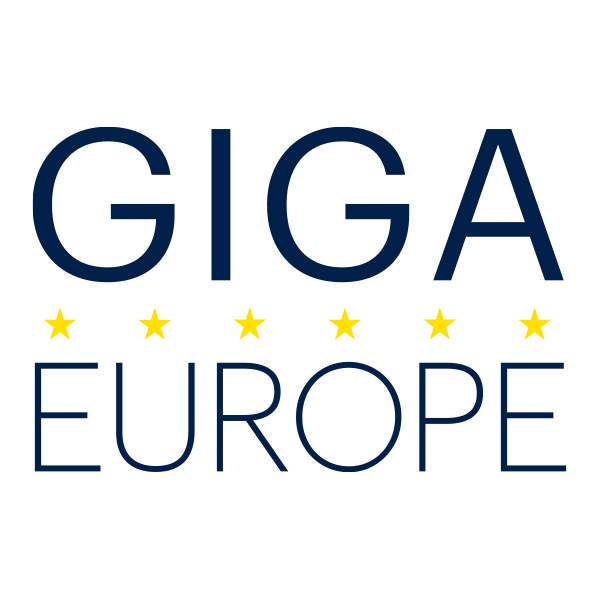Be Courageous, Confident, & Curious: Insights for Women in ICT
by GIGAEurope
Brussels – 08 March 2024
Irina Varlan, Managing Director of GIGAEurope, shares lessons learnt; offers tips for women pursuing careers in predominately male sectors; and inspires us all to step outside of our comfort zone.
How did you enter the telecoms sector?
I was fortunate to start my career in one of the most dynamic economic sectors (telecoms) and witness amazing technological advancements. My first job after law school was as a legal advisor for an American telecommunications company, where I learnt firsthand about the sector’s opportunities and challenges. It was love at first sight.
When did you arrive in Brussels and why?
I arrived virtually in 2020 when I accepted a challenge that I simply could not refuse. It was a great opportunity to remain in the ICT sector, work in the heart of EU policymaking, and learn something new – association management.
Also, I was keen to live in a cosmopolitan city and discover other cultures.
Did life in Brussels meet your expectations?
Fortunately, yes! It always seemed like a professional work environment with a lot of expertise. I also experienced the openness that comes from being in a multicultural community.
It is such an honour and privilege to live and work in this setting!
Brussels has a reputation for being boring and stuffy. Is this true?
That is unfair. There is no dull moment in Brussels. You interact with so many professionals and you continuously learn. In my personal life, there are so many opportunities to explore new places and experience culture. Access to nature is also an attraction – Belgium has a lot to offer from this perspective.
What did you find challenging in your new role?
Setting up a new industry association, during the pandemic, in a foreign country. Without connectivity and virtual tools, this would have been impossible.
I always knew that none of this would be easy, but I like challenges. They are the engine that keeps me going. When outside of our comfort zone, we are forced to innovate. Then we evolve.
What do you wish you learnt sooner?
Leading an association can sometimes be a lonely job. I wish that I would have reached out to my peers sooner. People are willing to help, and they understand the value of learning from others. Joining the European Society of Association Executives helped me realise that I was not alone and that sharing best practices with peers can really make a difference. My involvement in ESAE is now a passion. As a member of the Board, it is such a joy to give back to a network of people who gave so much to me.
Is this where you find community?
Yes, but I would first refer to the GIGAEurope team. My colleagues are committed and passionate. We enjoy working together.
As a people person, the key to success is surrounding myself with quality people. No one can do things alone and we cannot control everything. If you have a good team, with positive intentions, then you can deal with difficult circumstances in the best way possible.
Last but not least, joy is an important factor for me. Enjoying work gives people a better sense of accomplishment.
What are you proud of?
The courage and perseverance to take on new challenges, even under adverse circumstances. It has paid off as I meet new people, learn new things, and succeed in my endeavours. I become a better version of myself with each new challenge.
What helped you to progress professionally?
Staying alert and agile, having role models in my professional life, and benefitting from my superiors’ support. I learnt what leaders are valued for. Then I improved those skills and finetuned certain qualities.
How have you been able to pair family life with career advancement?
I could have never achieved so much without the constant love and support of my family. I have always worked long hours, and they have understood my drive and valued my success.
What would you like to do more of?
Get more involved in women-led initiatives. I think I could be of help to people. When I mentored in the past, I enjoyed seeing colleagues advancing their careers.
Do you have any tips for women starting or advancing their careers in ICT?
Be confident, courageous, and curious!
Women are still in the minority in many sectors. Especially in executive roles. A recent study finds that 75% of female executives across industries have experienced a feeling of inadequacy in their roles.
How you see yourself can have an impact on your salary, the roles that you go after, and your anxiety levels. That’s why self-confidence is one of the key ingredients for success!
What are your views on the state of the sector?
In the past, the ecosystem’s evolution occurred at a slower pace. Now, new technologies and services are emerging at an incredible speed. It is a challenge for telecommunications companies to make costly investments, operate in a tightly regulated market, and contend with a dynamic and increasingly complex connectivity ecosystem.
EU policies and regulations need to keep up with the evolution of the industry – allowing European companies to develop new business models and ways of working.
What would you like policymakers to pay more attention to?
It is great that EU policymakers have acknowledged the correlation between the adoption of advanced digital technologies and the rollout of very high-capacity network infrastructure. Industry and policymakers must work together towards policies that ensure no transformative technology passes Europe by. This includes enhanced predictability and investment certainty; greater scale for the sector; and increased user uptake of advanced digital technologies.
Our society is becoming increasingly digitalised. Any future policy framework must also include mechanisms to increase the level of digital skills and address the shortage of ICT specialists who can develop cutting-edge technologies here in Europe.
What are you looking forward to?
Eager to see the impact of advanced technologies, like AI, on the evolution of mankind.
RELATED ARTICLES

Do We Have All the Right Networks for the Future?

On the Digital Highway – Destination: a Competitive Europe

EU Connectivity Needs Fast Rollout – Policies Must Aid Objectives

Interconnecting the Connectivity Talks

The EU made the case for digital – now skills must follow

Precision Agriculture: Leveraging digital tools to respond to a dual imperative

Enabling the Enablers: A Path to Europe’s Green Transition

How to ensure no European is left behind?

How connectivity can help bridge the digital trust gap

Capturing Europe’s Connectivity Momentum

